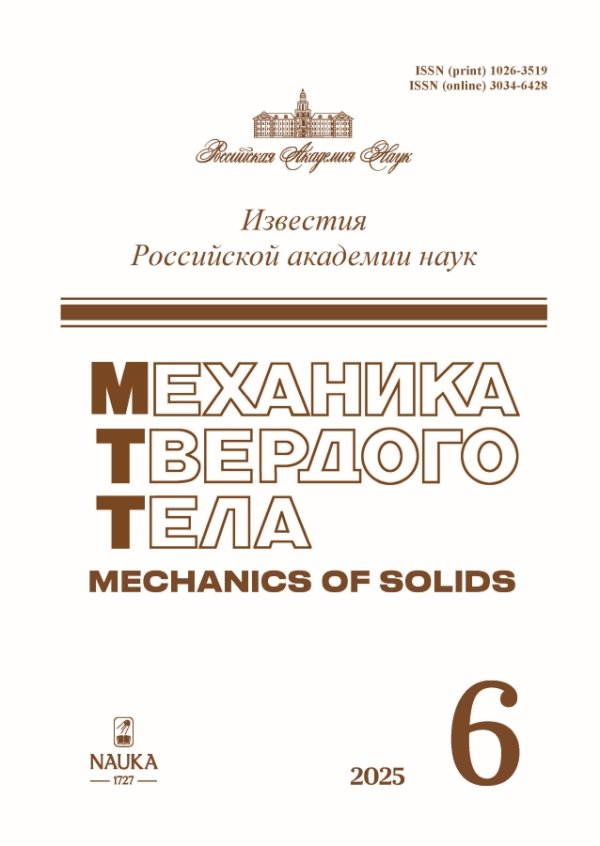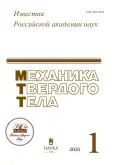Investigation of resistance to plastic deformation and oxidation of single-crystals of CO-AL-W-Ta alloy directionally solidified with a flat front
- Authors: Epishin A.I.1, Petrushin N.V.2, Svetlov I.L.2, Elyutin Е.S.2, Lisovenko D.S.3
-
Affiliations:
- Merzhanov Institute of Structural Macrokinetics and Materials Science RAS
- All-Russian Scientific Research Institute of Aviation Materials, National Research Center Kurchatov Institute
- Ishlinsky Institute for Problems in Mechanics RAS
- Issue: No 1 (2025)
- Pages: 249-258
- Section: Articles
- URL: https://bakhtiniada.ru/1026-3519/article/view/288572
- DOI: https://doi.org/10.31857/S1026351925010142
- EDN: https://elibrary.ru/szlsmy
- ID: 288572
Cite item
Abstract
Single crystals of cobalt-base alloy Co8.4Al9.4W1.9T, at. % with axial macro-segregation of tungsten and aluminum (gradient castings) were directionally solidified with a flat solidification front. Mini-specimens of different chemical compositions were cut from the obtained single-crystals at different casting heights for compression and oxidation tests. The tests performed at 900 °C showed that tungsten increases the yield strength of the alloy, while aluminum improves its oxidation resistance. It is shown that the method of directional solidification with a flat front can be effectively applied to optimize the physical and mechanical characteristics of multicomponent alloys of metals.
Full Text
About the authors
A. I. Epishin
Merzhanov Institute of Structural Macrokinetics and Materials Science RAS
Author for correspondence.
Email: a.epishin2021@gmail.com
Russian Federation, Chernogolovka, Moscow Region, 142432
N. V. Petrushin
All-Russian Scientific Research Institute of Aviation Materials, National Research Center Kurchatov Institute
Email: a.epishin2021@gmail.com
Russian Federation, Moscow, 105005
I. L. Svetlov
All-Russian Scientific Research Institute of Aviation Materials, National Research Center Kurchatov Institute
Email: a.epishin2021@gmail.com
Russian Federation, Moscow, 105005
Е. S. Elyutin
All-Russian Scientific Research Institute of Aviation Materials, National Research Center Kurchatov Institute
Email: a.epishin2021@gmail.com
Russian Federation, Moscow, 105005
D. S. Lisovenko
Ishlinsky Institute for Problems in Mechanics RAS
Email: lisovenk@ipmnet.ru
Russian Federation, Moscow, 119526
References
- Sato J., Omori T., Oikawa K. et al. Cobalt-base high-temperature alloys // Science. 2006. V. 312. № 5770. P. 90–91. https://doi.org/10.1126/science.1121738
- Pollock T.M., Dibbern J., Tsunekane M. et al. New Co-based γ-γ ′ high-temperature alloys // JOM. 2010. V. 62. № 1. P. 58–63. https://doi.org/10.1007/s11837-010-0013-y
- Bauer A., Neumeier S., Pyczak F. et al. Microstructure and creep strength of different γ/γ′-strengthened Co-base superalloy variants // Scripta Mater. 2010. V. 63. № 12. P. 1197–1200. https://doi.org/10.1016/j.scriptamat.2010.08.036
- Meher S., Yan H.-Y., Nag S. et al. Solute partitioning and site preference in γ/γ′ cobalt-base alloys // Scripta Mater. 2012. V. 67. № 10. P. 850–853. https://doi.org/10.1016/j.scriptamat.2012.08.006
- Koßmann J., Zenk C.H., Lopez-Galilea I. et al. Microsegregation and precipitates of an as-cast Co-based superalloy—microstructural characterization and phase stability modelling // J Mater Sci. 2015. V. 50. P. 6329–6338. https://doi.org/10.1007/s10853-015-9177-8
- Petrushin N., Hvatzkiy K., Gerasimov V. et al. A single-crystal Co-base superalloy strengthened by γ′ precipitates: structure and mechanical properties // Adv. Eng. Mater. 2015. V. 17. № 6. P. 755–760. https://doi.org/10.1002/adem.201500088
- Epishin A.I., Petrushin N.V., Link T. et.al. Investigation of the thermal stability of the structure of a cobalt heat-resistant alloy reinforced with intermetallic γ′-phase secretions // Deformation and Destruction of Materials. 2015. № 3. P. 17–22. (In Russian)
- Saal J.E., Wolverton C. Energetics of antiphase boundaries in γ′ Co3(Al,W)-based superalloys // Acta Mater. 2016. V. 103. P. 57–62. https://doi.org/10.1016/j.actamat.2015.10.007
- Midtlyng J., Epishin A.I., Petrushin N.V. et al. Creep behavior of a γ′-strengthened Co-base alloy with zero γ/γ′-lattice misfit at 800 °C, 196 MPa // J. Mater. Res. 2017. V. 32. № 24. P. 4466−4474. https://doi.org/10.1557/jmr.2017.424
- Epishin A., Petrushin N., Nolze G. et al. Investigation of the γ′-strengthened quaternary Co-based alloys Co–Al–W–Ta // Metall. Mater. Trans. A. 2018. V. 49. P. 4042–4057. https://doi.org/10.1007/s11661-018-4756-3
- Tomaszewska A., Oleksiak B. Microstructural characteristics of new type γ-γ ′ Co–9Al–9W cobalt-based superalloys in as-cast state // Metalurgija. 2018. V. 57. № 1–2. P. 91–94. https://hrcak.srce.hr/file/278975
- Epishin A., Chyrkin A., Nolze G. et. al. Interdiffusion in the face-centered cubic phase of the Co–Al–W–Ta system between 1090 and 1240 °C // JPED. 2018. V. 39. P. 176–185. https://doi.org/10.1007/s11669-018-0620-9
- Vigdorovich V.N., Volpyan A.E., Kurdyumov G.M. Directional crystallization and physico-chemical analysis. M.: Chemistry, 1976. 200 p. (In Russian)
- Sidorov V.V., Kablov D.E., Rigin V.E. Metallurgy of foundry heat-resistant alloys: technology and equipment. M.: VIAM, 2016. 368 p. (In Russian)
- Mishima Y., Ochiai S., Hamao N. et. al. Solid solution hardening of Nickel – role of transition metal and B-subgroup solutes // Trans. Jpn. Inst. Met. 1986. V. 27. № 9. 656–664. https://doi.org/10.2320/matertrans1960.27.656
- Aviation materials: Handbook in 13 volumes. Vol. 3. Foundry heat-resistant and intermetallic nickel-based alloys. 7th ed. M.: SIC “Kurchatov Institute”–VIAM, 2022. 192 p. (In Russian)
- Nikitin V.I. Corrosion and protection of gas turbine blades. M.: Mashinostroenie, 1987. 272 p. (In Russian)
Supplementary files













